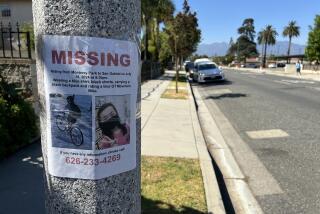NEWS ANALYSIS : Prosecutors Hail Passage of Rape Sentencing Law
Prosecutors and some legal experts Thursday hailed the Legislature’s passage of a bill requiring up to life in prison for first-time violent sex offenders, saying it will at least double the time most hard-core rapists spend behind bars and act as an effective deterrent to others.
*
Backers of the so-called “one-strike” measure, one of the most hotly debated crime bills ofthe year, boast that it now gives California what they believe is the toughest rape law in the nation.
“I think this is going to have a definite impact,” said Charles Nickel, a San Diego County deputy district attorney and specialist on sentencing rules. “In my view, the people won. We won. We got something good out of this.”
Although the state already has tough sentencing rules in place for serial rapists, Nickel and other legal experts contend that the one-strike law authored by state Sen. Marian Bergeson (R-Newport Beach) adds an effective weapon to the law enforcement arsenal.
They say the long sentences should deter some violent rapists and child molesters from continuing to commit sex crimes and put those who persist behind bars before they harm multiple victims.
“They’ll either stop, leave the state or be locked up,” said Nickel, who wrote a manual on prosecuting sex crimes distributed to district attorneys throughout the state. “All of that will help the public.”
But civil libertarians and defense attorneys continued to question the efficacy of the one-strike law, which Gov. Pete Wilson has made a major plank in his reelection campaign and has promised to sign. Wilson’s Democratic opponent, Kathleen Brown, also supports the one-strike law as it was passed.
Critics maintain that it will have little or no deterrent effect and worry that harsh penalties could be applied in unwarranted cases.
“The reality is people who commit crimes don’t read the penal code,” said Francisco Lobaco, the American Civil Liberties Union’s state legislative director. “This is just part of the election-year mood of the Legislature that started with the ‘three-strikes’ law and has culminated with this one, with a litany of other sentencing enhancements in between.”
As originally drafted, Bergeson’s bill required that nearly all sex offenders be sentenced to life in prison without the possibility of parole. The measure was widely attacked as so harsh it might hinder prosecutions or prompt rapists to kill their victims.
*
Even some celebrities weighed in. When word of the tough sex offender bill reached the Barbara Sinatra Children’s Center in Rancho Mirage, it prompted a strongly worded letter to Bergeson from Frank and Barbara Sinatra. They argued that victims of family child abuse would be “traumatized by guilt at having been placed in the position of putting someone who was ‘close’ to them in jail for life.”
After extensively reworking the bill, the Legislature approved a final version calling for a penalty of 25 years to life for the most brutal sexual assaults--those involving torture, mayhem, kidnaping or burglary with the intent to commit rape. Lesser sex crimes could earn sentences of 15 years to life, but would have to include special circumstances such as the use of a firearm or dangerous weapon, more than one victim or the administering of narcotics.
Under current sentencing laws, a single incident of rape is punishable by eight years in prison, but most sex offenders are released after less than five years. Violent rapists also can get out earlier with good behavior.
Currently, a knife-wielding rapist typically ends up serving 6 1/2 years if he has a record of good behavior. The same perpetrator sentenced under the one-strike formula would spend nearly 13 years behind bars, and be freed only by a decision of a parole board. Those sentenced to the maximum term of 25 years to life would not be eligible for parole for more than 21 years.
The one-strike bill won final approval Wednesday evening and the Department of Corrections has yet to estimate how many inmates it will add to the state prison system.
But an analysis based on the original bill determined that 361 inmates would be added to the state prison system in 1994-95. By 2000, the number would have grown to 7,354 additional inmates, requiring three new prisons at a construction cost of $713 million. The department estimates that 17,000 sex offenders are now in the 125,000-inmate state prison system.
The added demand resulting from the one-strike law follows the pressure for prison construction from the recent three-strikes law that deals with repeat felony offenders. The Department of Corrections has estimated that the state will need to build 25 prisons by 1999 to accommodate the growth in the prison population, much of it resulting from the three-strikes measure.
Even before the one-strike bill, the number of inmates in the state prison system was expected to double by the turn of the century.
Tip Kindel, assistant director and spokesman for the Department of Corrections, predicted that the new bill will yield a smaller increase in the prison population than expected. “The computer runs are being done as we speak,” he said.
Whatever the costs to taxpayers, the measure should have the beneficial effect of removing many violent sex offenders from society early on, said Mark A.R. Kleiman, an associate professor at Harvard’s John F. Kennedy School of Government.
“Violent sex offenses are one class of offenses where it does seem to me that hitting them the first time makes sense,” Kleiman said. “People who are sexual predators tend to do it for a long time, unlike armed robbery.”
Even so, Kleiman sees some practical problems with the legislation, most notably the effect of tough sentences on the psyches of prosecutors and juries.
“What you’re doing is moving the discretion from the judge to the prosecutor,” he said, arguing that “very severe sentences mean fewer sentences.” Knowing that juries may be reluctant to convict defendants to a sentence of 25 years to life except in the most aggravated of circumstances, prosecutors will often charge lesser offenses.
Even before the one-strike law, there was evidence that California was already experiencing a notable decrease in the number of rape cases. The state Department of Justice reports that there were 11,754 forcible rapes in California during 1993, or 37 per 100,000 population--a drop of 19% over the past decade. Federal figures put California in the middle, with 22 states having higher rates.
With such statistics in mind, some critics of the one-strike law contend that it is typical of politicians overreacting when Election Day nears.
Franklin E. Zimring, professor of law at UC Berkeley’s Boalt Hall, believes that the whole approach is naive, part of a general ratcheting up of sentencing generated by election-year politics.
“I would be enormously surprised if the rate of reported rapes decreases,” Zimring said. “But I don’t think that will be the issue. I know for a fact that people are not going to feel safe.”
Zimring said the rational approach to anti-crime efforts must begin with the recognition that “this state is not able to imprison itself into a condition of public safety.”
“All we can expect from the best and toughest of prison policies is reduction, not elimination, of crime or, for that matter recidivism,” Zimring said. “The prison population is five times as large as it was in 1980 . . . and people are more worried than ever.”
More to Read
Sign up for Essential California
The most important California stories and recommendations in your inbox every morning.
You may occasionally receive promotional content from the Los Angeles Times.






